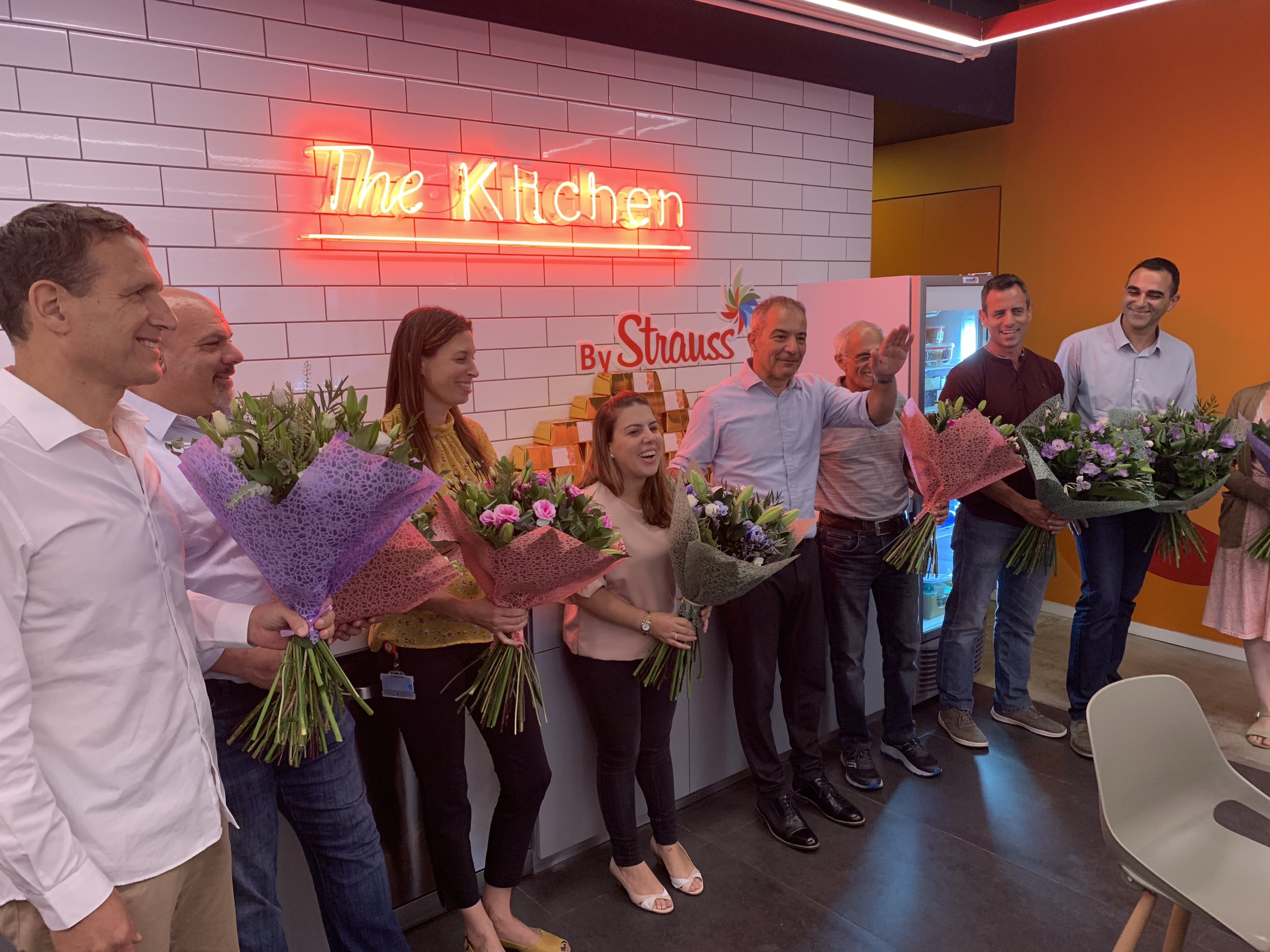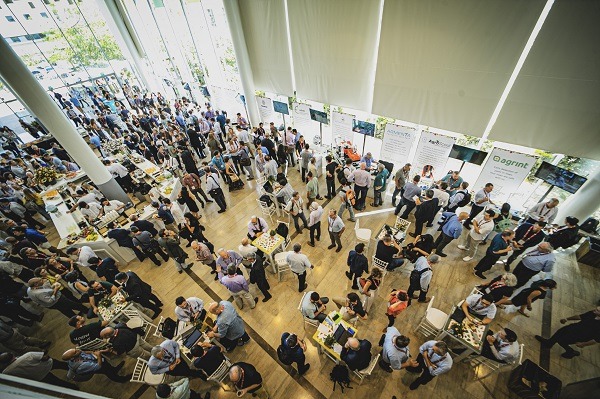I tucked into my first ever breakfast in Israel early this Sunday morning faced with a blatantly biblical reminder. On my hotel’s breakfast counter across from me stood an enormous, oozing slab of honeycomb — right next to a whirring milk dispenser. A typical morning, I presumed, in ‘a land flowing with milk and honey.’
Well, it turns out nothing is typical about the milk and honey here. Both are undergoing radical changes, whisked up by swift advances in Israeli agri and food tech.
Automated beekeepers — and bees, too?
Israel’s AgriFood Week has been buzzing with the potential for artificial intelligence to automate the beekeeping industry. This Tuesday afternoon on the sidelines of AgriVest 2019 in Tel Aviv, I ran into Beewise CEO Saar Safra, who handed over a tiny jar of honey with a QR sticker on top. It was a sample from the first-ever batch of honey “90%” made by robots and computer vision.

“Our target market is commercial apiaries,” he says, describing the bleak landscape at today’s beeyards of 10,000 to 15,000 hives, where there is a high death rate due to a lack of maintenance from overstretched and time-strapped beekeepers. AI monitoring allows for less disturbance of the bees than the arrival of enormous figures in white protective gear using smoke to stop the bees from stinging them. And robots can take action where necessary, again less stressful for the bees than human presence.
“The robot has time, it doesn’t have to do it fast,” he says. “Human beekeepers think their way of doing things now is normal because they have been doing it for hundreds of years.” He describes what he thinks is an absurd situation where so much of the world’s nutrition still relies on beehives that have hardly changed in design in over a hundred years.
Similar calls for beehive innovation came at an investors event put on by GrowingIL, a think tank with a mission to help cultivate the Israeli agri tech ecosystem. Held inside the Tel Aviv stock exchange on Wednesday night, and supported by Startup Nation Central, the event saw BeeHero CPO Michal Roizman advocate for the need for greater beehive intelligence, to save the time of workers and the lives of their bees. It is not clear, however, if they have a prototype yet.
Elsewhere in the bee tech space, there’s ToBe2. This team focuses on controlling the varroa mite, a longtime nemesis of bees, in a sustainable manner. They have developed a device for optimized delivery of anti-varroa compounds. This enables the drastic reduction in chemical use by several folds, while maintaining high control even where there is resistance. According to one analyst, the field trial results were impressive.
The automation of the hive does not stop with the role of the beekeeper; keep an eye on drone makers like the researchers at the Ben-Gurion University of the Negev that has a long history of robotics research. Here, professor Yael Edan has been looking into creating drones that mimic the flight and activity of bees. In essence, a pollinating. drone. Practically, that remains far from feasible on any sort of scale. There was also plenty of talk at Agrivest about potential ways to limit the need for crops to reproduce through pollination. For that, keep tabs on Edete — it is attempting to automate and control pollination to reduce bee dependency. Last year, AFN reported on its $3 million seed funding round.
Bumblebee is the newest player in this game. The are looking at imaging and AI based approaches to detect the right timing for pollination. The first crop it is trying is the Avocado. The founders boarded a flight this week for a first pilot in Peru, fully paid by a partner.
Alt-Dairy: swapping out soy for chickpeas
As for milk, all sorts of alternative dairy options are proliferating here at a giddy rate; after all, there’s a high rate of consumers demanding to go lactose-free in Israel — and there’s plenty of tech to help make that happen.
In the world of non-dairy baby formulas, Else Nutrition has developed a 100% plant-based baby formula made with almonds and buckwheat, in a natural process, without purified oil blends. The formula is non-dairy, non-soy, and free of hormones, antibiotics, gluten and GMO, the management team told me this week. It meets the nutritional golden standard of breast milk, the team say, while providing a solution for lactose intolerance, allergies and other sensitivities. It has a small environmental footprint and they claim it will reduce animal and environmental abuse.
Meanwhile, InnovoPro is developing tech to extract protein concentrate from chickpeas and make it into a milk alternative; as the Jerusalem Post reported a few days ago, it has announced teaming up with tofu manufacturer Wyler Farm to get its milk on the shelves by the end of the year. Its backers are Swiss retail giant Migros and Jerusalem Venture Partners chairman Erel Margalit. Headed by Dr. Ascher Shmulewitz, InnovoPro has secured $4.25 million in funding so far, according to the Post.
Then there are companies like Amarlane foods, which has been developing a butter or margarine alternative derived from coconut oil; the company is also working on a vegan whipped cream. Goodfoods is taking a slightly different angle, creating plant-based sauces like Tzatziki.
Israeli innovators are also trying to improve rather than replace cow-based dairy products. Armenta, for example, is using proprietary acoustic pulse therapy (APT) technology as an antibiotic-free treatment of bovine mastitis, proven to increase yield, improve quality, and reduce culling in dairy cows.
In the sphere of precision agriculture, Afimilk develops and manufactures computerized systems for dairy farm and herd management, including specialised sensors to track fertility, milk quality, and productivity.
“We actually need to move fast and urgently”
Much of this has been watched with interest by the Strauss Group, an Israeli dairy powerhouse that also has a wide portfolio of other food and drink products.
In an interview with AFN alongside reporters from Les Echos and FoodNavigator ahead of FoodTechIL earlier this week, Ofra Strauss, who chairs the group, said how she was positioning the company to be as receptive as possible to new innovations in the foodtech space, with a particular strategy involving its stewardship of the Kitchen FoodTech Hub that also received a round of funding from the Israeli government.
“We actually need to move fast and urgently,” she said. With the Kitchen, her company has a strategic front row seat to some of the biggest foodtech companies being built there under the watch of the likes of KitchenHub CEO Jonathan Berger and his leadership team. (As company builders go, this is a world-leading outfit; I saw much of this first hand on Thursday when hosted for a Rosh Hashanah lunch, full of reflections of the year ahead, including a poem lamenting the departure of one staff member with the “imagination of a man on fire.” A deeper profile of the Kitchen is forthcoming.)
Hypersweet proteins and plant-based probiotic yoghurts at The Kitchen
Served at the Rosh Hashanah lunch were yoghurts from their portfolio company Yofix. These had a refreshing banana flavor made from oats, legumes and seeds — and soy-free. Unable to attend the lunch was another potential changemaker in the global dairy industry: Amai Proteins CEO Dr Ilan Samish.
(I had met Dr Samish before in San Francisco, and you can read my profile here of how he is making proteins thousands of times sweeter than sugar.)
Just before I left the Kitchen, he recounted how he has been working with Danone in a new partnership agreement to help reduce their use of sugar. His company won Israel’s startup award this year, an award usually reserved for cybersecurity or biotech — a sweet sign that Israeli foodtech is catching wider attention.






